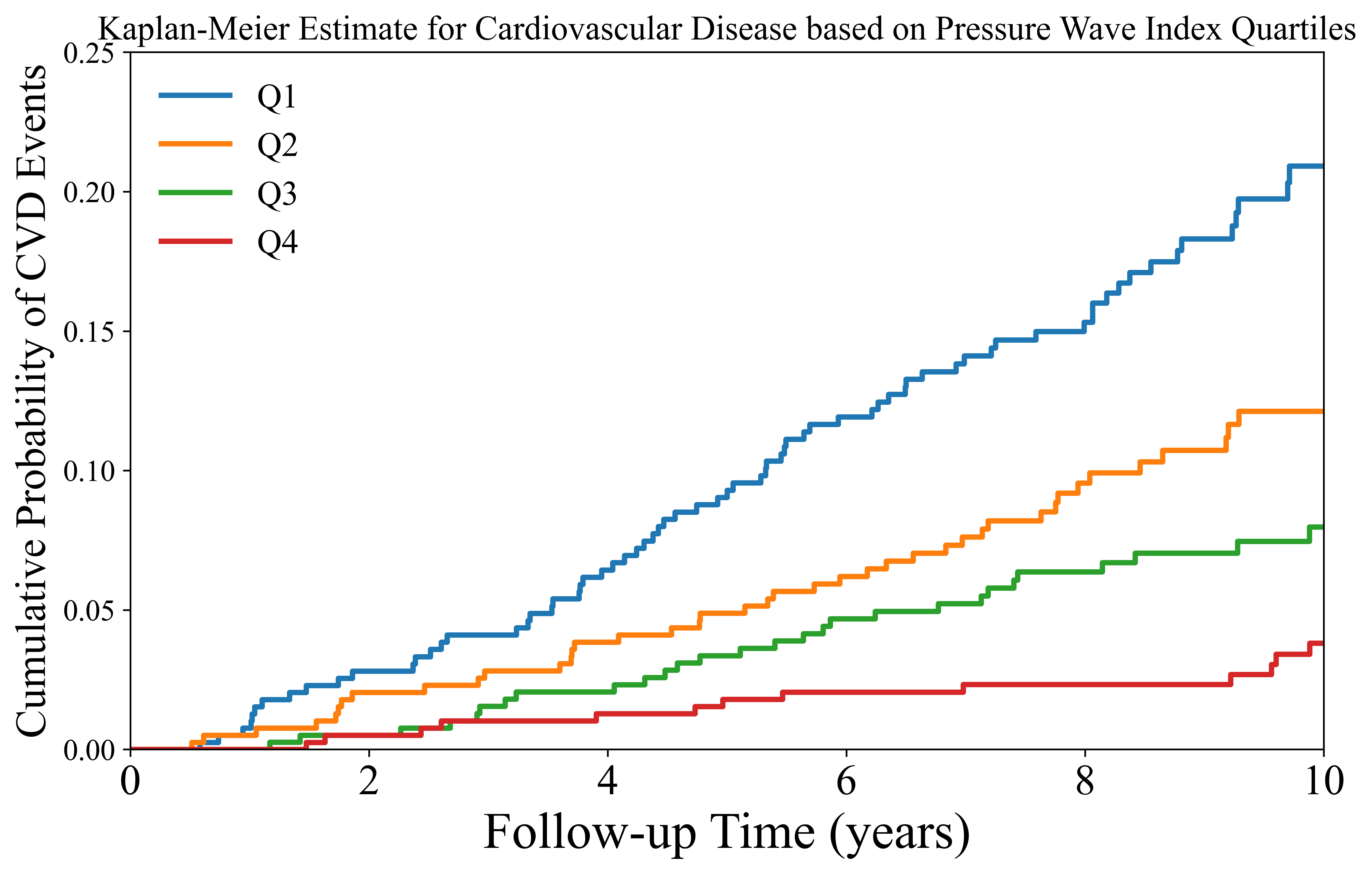Final ID: MDP1052
Predicting Cardiovascular Disease Events Using Uncalibrated Non-invasive Carotid Pressure Wave Components from Spectral Regression Learning
Abstract Body (Do not enter title and authors here): Introduction: Pressure wave separation is a powerful tool for investigating wave phenomena in the cardiovascular system. However, its clinical application has been limited by the need for concurrent measurements of pressure and flow waveforms. Moreover, its predictive value for cardiovascular disease (CVD) remains unclear.
Aim: This study aims to assess the performance of pressure wave components for CVD event prediction using single uncalibrated, non-invasive carotid pressure waveforms.
Methods: The sample for this study is drawn from the Framingham Heart Study and includes tonometry recordings of carotid pressure waveforms for participants free of CVD at baseline (N=5110; mean age 47 years, 55% women). A recent machine Learning methodology for pressure-only wave separation, called spectral regression learning method (Eur. Heart J. Open, 2024: oeae040) is applied to decompose the pressure waveform into forward and backward wave components. The pressure wave index, defined as the ratio of the peak backward wave to the sum of the peak forward and backward wave amplitudes, is computed in a testing population (N=1567) blinded to all stages of the regression learning development. Cox proportional hazards regression models and Kaplan-Meier analysis are used in this testing population to relate the pressure wave index to the first incident CVD event (166 cases) over a median follow-up of 9.6 years.
Results: The method-derived pressure wave index from uncalibrated carotid pressure waveforms is associated with incident CVD, adjusted for age and sex (model 1; hazard ratio, 0.66 [95% CI, 0.57–0.76] per SD; p<0.005), or adjusted for age, sex, brachial mean blood pressure, total cholesterol, high-density lipoprotein cholesterol, diabetes, and smoking (model 2; hazard ratio, 0.70 [95% CI, 0.59–0.83] per SD; p<0.005). A lower pressure wave index is associated with an increased risk of CVD events (cumulative event trajectories from Kaplan-Meier analysis are shown in Fig. 1).
Conclusion: Our results demonstrate that the proposed uncalibrated carotid pressure wave index, which can be acquired using affordable non-invasive devices like wearable electronics, is an indicator of vascular health and cardiovascular disease risk.
Aim: This study aims to assess the performance of pressure wave components for CVD event prediction using single uncalibrated, non-invasive carotid pressure waveforms.
Methods: The sample for this study is drawn from the Framingham Heart Study and includes tonometry recordings of carotid pressure waveforms for participants free of CVD at baseline (N=5110; mean age 47 years, 55% women). A recent machine Learning methodology for pressure-only wave separation, called spectral regression learning method (Eur. Heart J. Open, 2024: oeae040) is applied to decompose the pressure waveform into forward and backward wave components. The pressure wave index, defined as the ratio of the peak backward wave to the sum of the peak forward and backward wave amplitudes, is computed in a testing population (N=1567) blinded to all stages of the regression learning development. Cox proportional hazards regression models and Kaplan-Meier analysis are used in this testing population to relate the pressure wave index to the first incident CVD event (166 cases) over a median follow-up of 9.6 years.
Results: The method-derived pressure wave index from uncalibrated carotid pressure waveforms is associated with incident CVD, adjusted for age and sex (model 1; hazard ratio, 0.66 [95% CI, 0.57–0.76] per SD; p<0.005), or adjusted for age, sex, brachial mean blood pressure, total cholesterol, high-density lipoprotein cholesterol, diabetes, and smoking (model 2; hazard ratio, 0.70 [95% CI, 0.59–0.83] per SD; p<0.005). A lower pressure wave index is associated with an increased risk of CVD events (cumulative event trajectories from Kaplan-Meier analysis are shown in Fig. 1).
Conclusion: Our results demonstrate that the proposed uncalibrated carotid pressure wave index, which can be acquired using affordable non-invasive devices like wearable electronics, is an indicator of vascular health and cardiovascular disease risk.
More abstracts on this topic:
A Non-invasive In Vivo Experimental Model of Heart Failure Using Optogenetic Tachypacing in Larval Zebrafish
Savoie Emma, Ramadan Ahmed, Purvis Katherine, Stoyek Matthew, Quinn Alex
A Novel Cardiac Simulator "ped UT-Heart" to Support Decision-Making in Surgical Procedures for Complex Congenital Heart DiseaseShiraishi Isao, Kurosaki Kenichi, Iwai Shigemitsu, Washio Takumi, Sugiura Seiryo, Hisada Toshiaki

